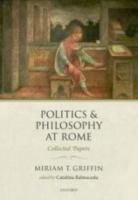
OUP (2018) h/b 775pp £120. (ISBN 9780198793120)
G. was fellow and tutor at Somerville College Oxford for thirty-five years and made a massive contribution to the study of Roman History, Historiography and Philosophy. This meaty book is but a part of her oeuvre which included major books on Seneca and Nero as well as extraordinarily fruitful collaborations with Jonathan Barnes (Philosophia Togata I and II) and others. Even at close on 800 pages this giant tome cannot do justice to the lady who only this year was awarded the British Academy Medal for her lifetime achievement.
It is both easy and impossible to review. It is impossible to even describe, let alone analyse, the contents of all the fifty papers gathered here, some of them previously unpublished. It is (on the other hand) easy to give this a five-star rating as the work here is the result of many years of peer-reviewed polishing and the finished text is pretty well perfect in scope and in execution. The papers are grouped under the three broad headings of: Roman History (10 papers), Roman Historiography (15 papers) and Philosophy and Politics (25 papers). If that all sounds daunting, then do not be daunted. Griffin always had the knack of writing in a way which is both clear and entertaining—as well as being accurate and scholarly. Her incisive and witty piece (co-authored with her husband Jasper) ‘Show us you care, ma’am’ (323-4: first published in The New York Review of Books in 1997) analysed the public mourning after the death of Diana Princess of Wales and the parallels with the death of Germanicus. In other places she can let her academic hair down—see her riff (248) on Tacitus and Pliny as Holmes and Watson, Eeyore and Pooh or even Laurel and Hardy.
She wrote as she spoke, with clarity and always a twinkle of enjoyment. Pliny is not everyone’s cup of Chianti, but in Griffin’s hands the old epistolographer comes charmingly to life and makes one dust him off for reassessment after reading her piece ‘Pliny’s Letters: Between History and E-mail’ (287-295). She knows the primary texts inside out, but she also knows their reception history, and her words on how Roman authors have been handled by scholars show her eye for the Zeitgeist throughout: in particular she handles the work of her doctoral supervisor Ronald Syme with the same judicious analysis as she does the texts they both worked on. Tacitus is shown to be the sharpest of sharp critics of his own times and Griffin shows how this matters to all of us concerned with power-struggles on a global scale, and how you cannot escape the philosophical importance of political events.
G. began her graduate work (as she tells us in a typically modest ‘Author’s Prologue’) at a time when Roman Philosophy was seen as something of an oxymoron. Her unique achievement was to put Latin writers back into the canon of ancient philosophy and to show how the Romans engaged with and developed the Greek philosophy they admired into a series of practical systems of thought, breaking new ground (with their focus on clementia for instance and with their creation of a new vocabulary) as well as rehashing Plato. Seneca was the topic of her D.Phil. thesis and the subject of her major book Seneca: a Philosopher in Politics (1976) and she raised the profile of the Stoic sage higher than it had been since antiquity. He was perfect material for her skills as a historian and as a critic of both his style and his ideas, and over a dozen of the papers here examine Seneca in one way or another. Less obvious is the use of moral philosophy by Pliny, but Griffin opens that up (611-627) too, as well as unpacking the voluminous and under-rated philosophical works of Cicero. Griffin might have smiled if one had described her as a philosopher, but papers such as ‘When is Thought Political?’ (which started life as a book-review) shows her able to handle and criticise the work of the finest minds in the ancient (and more modern) world, and the paper dealing with Cicero’s correspondence with Matius in 44 BC (‘From Aristotle to Atticus’) is a model of her especial blend of history, philosophy and literary criticism.
The editor has done a wonderful job. Each section begins with a paper which in some way outlines the major general issues which the subsequent essays will look at in more detail. Quotations from Latin and Greek have been translated into English in places where they were not already, which puts this inspiring book within the reading range of all, and there is a full index and a bibliography of works cited. I would have liked to have read a fuller assessment of her life and work from someone besides her own modest self, with a separate list of her many books and articles. This is a small quibble, however, and she would no doubt have replied that her work, not her life, is all that matters. And that is a great deal, as this book amply shows.
John Godwin
